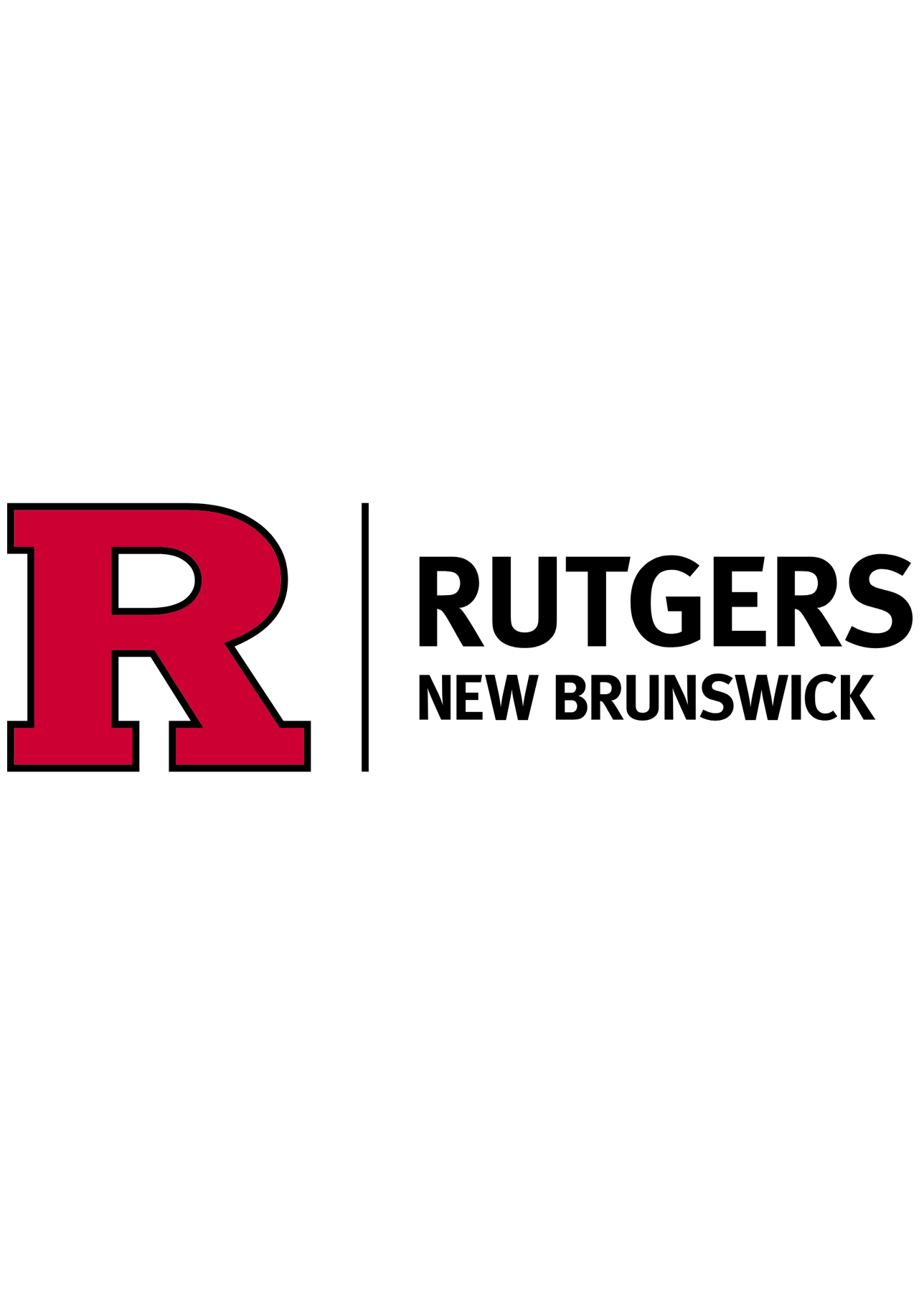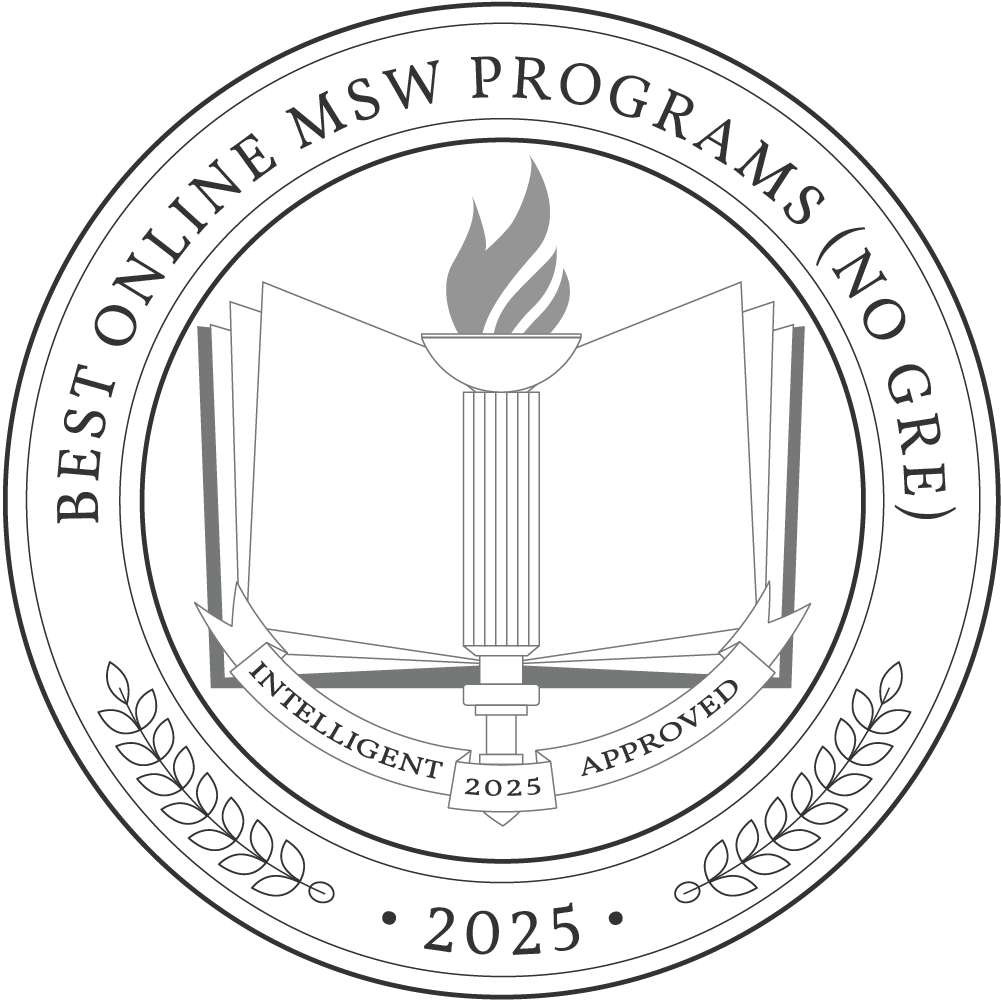Becoming a social worker enables you to play a role in improving the lives of countless individuals, families, and groups. While many social workers begin their careers after earning a BSW degree, many more continue on to earn a master’s degree in social work. This post-baccalaureate degree can open doors to new opportunities and higher-level jobs with more responsibilities and a higher pay rate.
When selecting an online MSW program, one of the many considerations is whether you want to apply to a program that requires applicants to submit GRE scores. Applying to a program that doesn’t require GRE scores can save students time and money, but this is a personal decision unique to each student.
This article explores the best online MSW programs with no GRE requirements and guides students on choosing whether to submit GRE scores as part of their application. It also includes insights from Leslie Reyna, admissions counselor for the University of Texas at Arlington’s School of Social Work.
How To Get Into an MSW Program Without Taking the GRE
The Graduate Record Exam, or GRE, is a standardized test used by some graduate degree programs as part of the admissions process. It includes three sections — Verbal Reasoning, Quantitative Reasoning, and Analytical Writing. Although the GRE has been a common component of graduate school applications for decades, many schools in recent years have dropped the test from its application requirements.
The simplest way to get into an online MSW program without taking the GRE is to seek out programs that don’t require the GRE as part of their application. Most programs clearly state in their application requirements whether students must submit GRE scores, but if you’re unsure, contact the school’s admissions office or program representatives for clarification. Some schools have test-blind or test-optional policies, which leave the decision to submit GRE scores up to the student.
To get into an MSW program with no GRE requirements, students must have a strong application demonstrating their academic aptitudes, experience, and professionalism, and passion for social work. Each program sets its own admissions criteria, but these programs will likely have a minimum undergraduate GPA requirement (usually a 3.0 or higher) and prerequisite courses that students must complete before enrolling in their MSW program.
Having positive letters of recommendation and a well-written personal statement are also key to getting accepted into an MSW program with no GRE requirements. Admissions staff and program faculty use these application elements to understand applicants’ abilities, strengths, interests, and overall suitability for the program.
For strong letters of recommendation, find references who know you well and can speak to your interests and abilities in the social work field. References can include current or former teachers, employers, colleagues, and internship supervisors. Provide your references with enough notice so they have the time to write a detailed, thoughtful recommendation that gives the admissions committee ample information to consider.
As for your personal statement or essay, this is your chance to tell an admissions committee why you’re passionate about pursuing an MSW and a social work career, and why you and this particular program are a good match. Give yourself enough time to write a clear, detailed statement and have someone you trust review it before submitting it.
Pros and cons of online MSW programs (no GRE)
Choosing to apply to an online MSW program that has no GRE requirements is a personal decision that has advantages and disadvantages.
For some, taking the GRE is a barrier to entry. It currently costs $220 to register for the GRE, and there are additional fees if students need to change their test date or location. It’s also a significant time commitment. The test itself takes about four hours to complete, but most students also need time to study and prepare for the exam. This can include GRE prep courses, which can cost hundreds or thousands of dollars and require hours of study over the course of several weeks or months. For students with limited budgets or who want to enroll in an MSW program as soon as possible, this can create obstacles to pursuing their degree.
Some students may also feel like a standardized test doesn’t accurately capture their aptitudes and experience as aspiring social work students. These students may prefer applying to online MSW programs with no GRE requirements so they can demonstrate in other ways that they have the background and qualifications required to excel in an online MSW program.
Conversely, submitting GRE scores can benefit students who don’t have a strong undergraduate academic record. For these students, a high GRE score can demonstrate to potential schools that they have the scholastic aptitudes necessary for success in an MSW program and that they’ve improved their academic habits since earning their bachelor’s degree.
The 40 Online MSW Programs (No GRE)
Institution Type
Status
- Intelligent Score
- Alphabetically By University Name
- Acceptance Rate
- Enrollment
- In-state Graduate Tuition
- Out-of-state Graduate Tuition
- In-state Undergraduate Tuition
- Out-of-state Undergraduate Tuition

University of Central Florida
Intelligent Score: 99.06In-state: $4,478
Out-of-state: $19,810
In-state: $6,916
Out-of-state: $6,916
SAT: 1160-1340
ACT: 25-30
$487
Online
Council on Social Work Education
62

University of South Florida
Intelligent Score: 98.69In-state: $4,559
Out-of-state: $15,473
In-state: $8,350
Out-of-state: $8,350
SAT: 1160-1320
ACT: 25-30
$550
Online
Council on Social Work Education
60

Rutgers University - New Brunswick
Intelligent Score: 98.68In-state: $12,230
Out-of-state: $29,012
In-state: $17,736
Out-of-state: $17,736
SAT: 1180-1410
ACT: 25-32
$1,007
Online
Council on Social Work Education
60

University of Georgia
Intelligent Score: 97.86In-state: $9,790
Out-of-state: $28,830
In-state: $8,878
Out-of-state: $8,878
SAT: 1250-1460
ACT: 29-33
$629
Online
Council on Social Work Education
60

University of Southern California
Intelligent Score: 95.73In-state: $59,260
Out-of-state: $59,260
In-state: $47,880
Out-of-state: $47,880
SAT: 1340-1530
ACT: 30-34
$2,137
Online
Council on Social Work Education
24-48

University of Michigan
Intelligent Score: 95.27In-state: $16,520
Out-of-state: $53,669
In-state: $24,344
Out-of-state: $24,344
SAT: 1340-1520
ACT: 31-34
In-State: $1,844
Out-of-State: $2,968
Online
Council on Social Work Education
45

Ohio State University
Intelligent Score: 94.79In-state: $10,615
Out-of-state: $32,599
In-state: $11,560
Out-of-state: $11,560
SAT: 1210-1430
ACT: 26-32
In-State: $440 - $882
Out-of-State: $453 - $1,105
Online
Council on Social Work Education
63

University of Louisville
Intelligent Score: 94.78In-state: $11,966
Out-of-state: $28,312
In-state: $13,260
Out-of-state: $13,260
SAT: 1050-1270
ACT: 21-28
$791
Online
Council on Social Work Education
30-60

University of Alaska Anchorage
Intelligent Score: 94.37In-state: $36,848
Out-of-state: $50,432
In-state: $39,954
Out-of-state: $39,954
SAT: 1030-1250
ACT: 18-25
In-State: $513
Out-of-State: $1,079
Online
Council on Social Work Education
34-61

California State University, San Bernardino
Intelligent Score: 93.81In-state: $5,742
Out-of-state: $17,622
In-state: $7,176
Out-of-state: $7,176
SAT: 870-1060
ACT: 15-20
$650
Online
Council on Social Work Education
36-73

Simmons University
Intelligent Score: 93.54In-state: $40,850
Out-of-state: $40,850
In-state: $21,528
Out-of-state: $21,528
SAT: 1060-1250
ACT: 24-29
$1,148
Online
Council on Social Work Education
34-65

Tulane University School of Social Work
Intelligent Score: 92.67In-state: $83,890
Out-of-state: $83,890
In-state: $50,674
Out-of-state: $50,674
SAT: 1370-1510
ACT: 31- 33
$1,276
Online
Council on Social Work Education
60

Widener University
Intelligent Score: 92.41In-state: $47,770
Out-of-state: $47,770
In-state: $24,500
Out-of-state: $24,500
SAT: 1035-1210
ACT: 20-26
$943
Online
Council on Social Work Education
36-57

Indiana University
Intelligent Score: 90.51In-state: $9,815
Out-of-state: $36,194
In-state: $9,786
Out-of-state: $9,786
SAT: 1120-1350
ACT: 24-31
In-State: $624
Out-of-State: $741
Online
Council on Social Work Education
60

The University of Texas at Arlington
Intelligent Score: 90.31In-state: $11,448
Out-of-state: $40,032
In-state: $12,028
Out-of-state: $12,028
SAT: 1210-1470
ACT: 26-33
In-State: $365
Out-of-State: $1,079
Online
Council on Social Work Education
38-61

Columbia School of Social Work
Intelligent Score: 90.09In-state: $57,864
Out-of-state: $57,864
In-state: $49,024
Out-of-state: $49,024
SAT: 1460-1570
ACT: 33-35
$1,854
Online
Council on Social Work Education
33-60

Sacred Heart University
Intelligent Score: 89.44In-state: $44,080
Out-of-state: $44,080
In-state: $34,806
Out-of-state: $34,806
SAT: N/A
ACT: N/A
$840
Online
Council on Social Work Education
30-60

National University
Intelligent Score: 88.34In-state: $13,320
Out-of-state: $13,320
In-state: $15,480
Out-of-state: $15,480
SAT: N/A
ACT: N/A
$442
Online
Council on Social Work Education
36-60
How We Rank Schools
This list features some of the country’s best online MSW programs (no GRE). Each school featured is a nonprofit, accredited institution, either public or private, with a high standard of academic quality for post-secondary institutions.
We evaluated each school’s program on tuition costs, admission, retention and graduation rates, faculty, and reputation. Then, we calculated the Intelligent Score on a scale of 0 to 100. Read more about our ranking methodology.
Next, we compared this comprehensive list of the best online MSW programs (no GRE) to a list of aggregated college rankings from reputable publications, such as U.S. News & World Report, to simplify a student’s college search. We pored through these rankings so students don’t have to.
How To Choose an Online MSW Program
Consider your academic and career goals
The first step in choosing an online MSW program is determining what your career and academic goals are, so you can find a program that meets your needs.
For social work programs, you’ll also need to identify if you’re eligible for advanced standing MSW programs, which require students to have a Bachelor of Social Work, or if you’ll need to enroll in a traditional MSW program for students without prior social work education.
You may want to incorporate a specialization into your MSW program based on your career goals. Common social work specializations include child welfare, substance misuse and recovery, aging, healthcare, justice and corrections, and developmental disabilities. Identifying an area of specialization can help you narrow your search to programs that offer your preferred concentration.
It’s also wise to determine at this point if an online program is right for you compared to an in-person program. “While online learning can make earning an MSW more accessible, it’s not for every student,” Reyna says. She encourages students to think about their learning styles compared to standard online instruction methods, including pre-recorded lectures, videos, reading assignments, and independent work.
“Reflect on your self-discipline, motivation, time management, and organizational skills, as these are crucial to success in an online program,” she adds.
If an online program is the best fit for you, consider whether you want a program that offers classes synchronously or asynchronously.
Research schools and programs
Once you’ve established what you’re looking for in an online MSW program, you can begin exploring the different program options available to you.
One of the most important things to consider when evaluating online MSW programs is their accreditation status. A common requirement for a state-issued social work license is an MSW from a program accredited by the Council on Social Work Education (CSWE). According to Reyna, “If students pursue a degree from an unaccredited MSW program, they run the risk of being unable to pursue licensure.” Students should also confirm that the institution they’re attending is accredited by a regional accrediting agency to ensure they are eligible for financial aid and future educational opportunities.
Other common questions that students should ask when assessing potential online MSW programs include:
- Who are the faculty, and what are their social work areas of expertise?
- What type of social work specialization options are available in this program?
- What are the clinical requirements for this program?
- How do online students interact with classmates, faculty, and staff?
- What type of technical, academic, career, and mental health support services are available to online students?
To learn more about advanced-standing online MSW programs, visit the school’s website, speak to admissions counselors and program representatives, and attend virtual open houses or information sessions when available.
Prepare and submit your application
As noted above, each online MSW program sets its own application requirements and procedures. Students should be mindful of eligibility criteria, including whether the program only accepts students with a BSW and if there is a time limit on when they received their BSW.
Programs that don’t require GRE scores will want to see strong applications that demonstrate students’ qualifications in other ways. A standard application for an online MSW (no GRE) includes:
- Completed application and fee
- Official undergraduate transcripts
- Letter(s) of recommendation
- Personal statement or essay
- Resume or CV
Programs may also require students to participate in virtual or in-person interviews to help gauge their readiness and suitability for the program. Contact the school’s admissions office to confirm application requirements and deadlines. Some programs enroll students multiple times per year, while others only have one or two start terms per year.
Determine how you’ll pay for your degree
As you’re researching online MSW programs, take note of their tuition and fees, as well as the availability of scholarships, grants, fellowships, and tuition discounts. It’s generally (but not always) true that private institutions charge more than public schools since they don’t receive state subsidies. However, online students should note that public schools may charge different tuition for in-state and out-of-state students. If you choose a school that is not in the state where you reside, you may pay significantly more.
Students who are seeking need-based aid to help them cover the cost of their online MSW should complete the Free Application for Federal Student Aid (FAFSA). Schools use FAFSA information to determine eligibility for federal student aid, including loans, as well as institutional need-based aid. We strongly encourage students to research student loans and repayment options before committing to borrowing money to fund their social work degree.
Another option to help pay for an online MSW degree is employer tuition assistance benefits if you plan on working while earning your degree.
Social Work Salary and Career Outlook
The employment outlook for the social and community services field is strong, according to the Bureau of Labor Statistics (BLS). The agency predicts that employment in this sector will grow at a faster-than-average pace through 2032, translating to approximately 281,600 new jobs per year on average during that time.
Having an MSW will qualify social workers for a broader range of positions and increase their earning potential. “Social work students can become licensed clinical social workers by fulfilling their state’s supervised clinical practice hours and taking a licensure exam,” Reyna says. “As students become licensed, they can earn upwards of $75,000 to $90,000 per year, depending on the state where they practice. I’ve also seen many social workers create their own counseling centers and non-profits after achieving licensure.”
Specific jobs within the social work field that students with an advanced standing MSW qualify for include:
- Social workers — Help individuals, groups, and families prevent and cope with problems in their everyday lives.
- Median annual salary: $61,420
- Projected employment growth (through 2032): 7%
- New jobs projected: 63,800 per year
- Marriage and family therapists — Work with individuals, couples, families, and other groups to diagnose and treat cognitive, behavioral, or similar disorders in relationships and interpersonal dynamics.
-
- Median annual salary: $56,570
- Projected employment growth (through 2032): 15%
- New jobs projected: 5,900 per year
- Licensed mental health counselors — Help individuals cope with and recover from a range of issues, including depression, anxiety, trauma, addiction, behavioral disorders, and more.
- Median annual salary: $49,710
- Projected employment growth (through 2032): 18%
- New jobs projected: 42,000 per year
Other Social Work Degree Resources
- Can You Study Social Work Online?
- What Can You Do With A Social Work Degree?
- What Jobs Can You Get With A Social Work Degree?
- How To Get A Degree In Social Work
- LMSW vs. LCSW: What’s the Difference?
- MSW vs. MSSW vs. MSSA: Which One is Right For Me?
- Micro, Mezzo, and Macro Social Work: What’s the Difference?
- MSW vs. LCSW: What’s the Difference?
